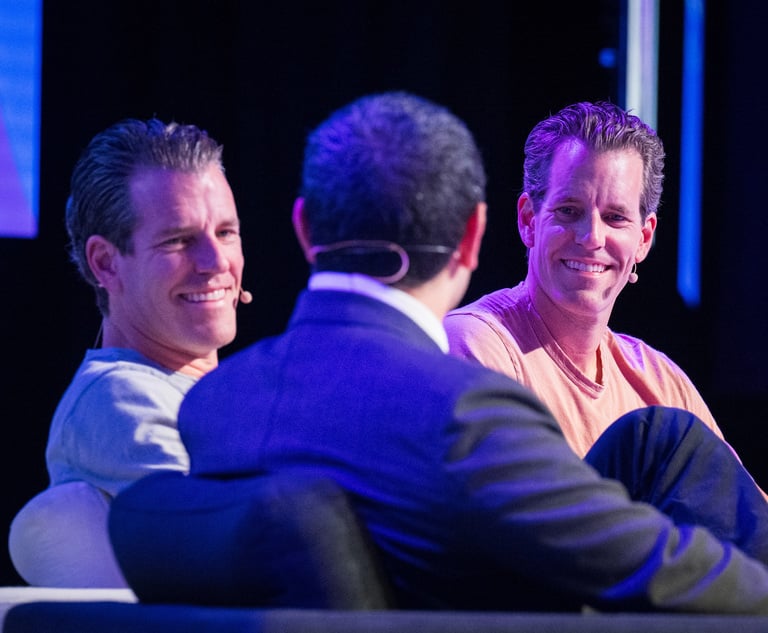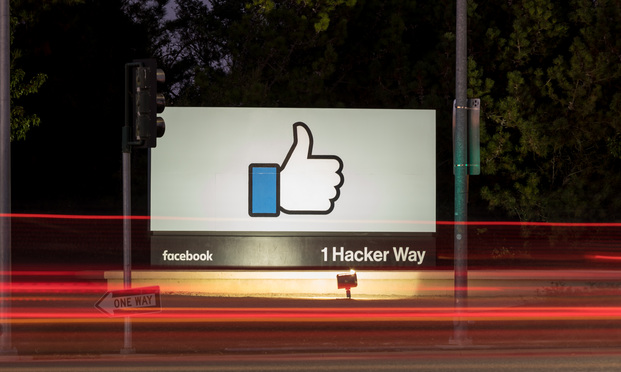French High Court Strikes Down Law Restricting Online Content
The ruling from France's Constitutional Council leaves intact the body of French law that prohibits hate speech, a category that includes racial slurs, denial of the Holocaust, and incitement to violence.
June 22, 2020 at 03:03 PM
4 minute read
The original version of this story was published on Law.com International
A new French law that would have required such social media platforms as Facebook to take down objectionable content within 24 hours has been rejected by France's Constitutional Council as a disproportionate response to the proliferation of hate speech online.
The ruling is a limited victory for free-speech advocates and a temporary reprieve for Facebook and other platforms, which under the new law would have faced heavy costs for real-time mediation of content and heavy fines for failure to comply, media lawyers told Law.com International.
France's Conseil Constitutionnel, the equivalent of the Supreme Court, ruled on June 18 that the new Loi Avia, which had passed both houses of the French parliament, would infringe "freedom of expression and communication" in a way that was "not appropriate, necessary and proportionate to the goal being pursued."
The ruling leaves intact the body of French law that prohibits hate speech, a category that includes racial slurs, denial of the Holocaust, and incitement to violence.
But it sends the government back to the drawing board to find a more nuanced way to make platforms such as Facebook and Twitter, and their powerful corporate owners, responsible for the content posted by users.
"The intentions behind the law were good," said Basile Ader, a media law partner at August Debouzy in Paris. "But the Constitutional Council made it clear that these goals should be achieved in a measured, proportionate way—not with a hatchet."
The law and its potential application to Facebook made headlines in France earlier this month after a French website published screen grabs of racist comments that appeared in a private Facebook group for 8,000 law enforcement agents. The publication came amid protests in France and around the world of the killing of men and women of color by police officers.
The French interior minister, Christophe Castaner, said the government would sue to compel Facebook to divulge the names of the people posting the content so that they could be prosecuted for public hate speech. Under French law, private social media groups are considered public once they reach a certain size, and law enforcement officers are held to a higher standard of public expression.
Under the Loi Avia, Facebook would have been compelled to take the comments down, Ader of August Debouzy said.
"But with the core of that law now rejected, the situation is more complicated," he said. "The government will need to find another way to make the platforms take more responsibility."
The approval and disapproval of the Loi Avia highlight not only the intellectual challenge of policing free speech in a democracy, but also the technical challenge of policing social media platforms where communications are instantaneous and round the clock, lawyers said.
In its ruling, the Constitutional Council noted the provisions of the new law that would have required platforms to take down objectionable content within 24 hours or face heavy fines.
Julien Guinot-Deléry, a media law counsel at Gide Loyrette Nouel, explained that in order to react that quickly, the platforms would either have to set up 24/7 content review by human moderators or get any post-publication complaints before a judge within 24 hours, the latter an impractical and unlikely outcome, he said.
What was more likely, he said, is that the platforms would set up an automated system to immediately take down any content that drew a complaint.
It is this outcome, Guinot-Deléry said, that raised the possibility before the constitutional body that the law, as written, posed too great a risk of overregulation.
"When you're talking about a cornerstone issue like freedom of expression, it's difficult to see how you can neglect the human element," he said.
This content has been archived. It is available through our partners, LexisNexis® and Bloomberg Law.
To view this content, please continue to their sites.
Not a Lexis Subscriber?
Subscribe Now
Not a Bloomberg Law Subscriber?
Subscribe Now
NOT FOR REPRINT
© 2025 ALM Global, LLC, All Rights Reserved. Request academic re-use from www.copyright.com. All other uses, submit a request to [email protected]. For more information visit Asset & Logo Licensing.
You Might Like
View All
TikTok Hit With California Class Action for Allegedly Mining Children's Data Without Parental Consent

Apple Disputes 'Efforts to Manufacture' Imaging Sensor Claims Against iPhone 15 Technology

‘Not a Regulatory Gray Area’: CFTC Secures $5M Settlement From Gemini
3 minute readLaw Firms Mentioned
Trending Stories
Who Got The Work
Michael G. Bongiorno, Andrew Scott Dulberg and Elizabeth E. Driscoll from Wilmer Cutler Pickering Hale and Dorr have stepped in to represent Symbotic Inc., an A.I.-enabled technology platform that focuses on increasing supply chain efficiency, and other defendants in a pending shareholder derivative lawsuit. The case, filed Oct. 2 in Massachusetts District Court by the Brown Law Firm on behalf of Stephen Austen, accuses certain officers and directors of misleading investors in regard to Symbotic's potential for margin growth by failing to disclose that the company was not equipped to timely deploy its systems or manage expenses through project delays. The case, assigned to U.S. District Judge Nathaniel M. Gorton, is 1:24-cv-12522, Austen v. Cohen et al.
Who Got The Work
Edmund Polubinski and Marie Killmond of Davis Polk & Wardwell have entered appearances for data platform software development company MongoDB and other defendants in a pending shareholder derivative lawsuit. The action, filed Oct. 7 in New York Southern District Court by the Brown Law Firm, accuses the company's directors and/or officers of falsely expressing confidence in the company’s restructuring of its sales incentive plan and downplaying the severity of decreases in its upfront commitments. The case is 1:24-cv-07594, Roy v. Ittycheria et al.
Who Got The Work
Amy O. Bruchs and Kurt F. Ellison of Michael Best & Friedrich have entered appearances for Epic Systems Corp. in a pending employment discrimination lawsuit. The suit was filed Sept. 7 in Wisconsin Western District Court by Levine Eisberner LLC and Siri & Glimstad on behalf of a project manager who claims that he was wrongfully terminated after applying for a religious exemption to the defendant's COVID-19 vaccine mandate. The case, assigned to U.S. Magistrate Judge Anita Marie Boor, is 3:24-cv-00630, Secker, Nathan v. Epic Systems Corporation.
Who Got The Work
David X. Sullivan, Thomas J. Finn and Gregory A. Hall from McCarter & English have entered appearances for Sunrun Installation Services in a pending civil rights lawsuit. The complaint was filed Sept. 4 in Connecticut District Court by attorney Robert M. Berke on behalf of former employee George Edward Steins, who was arrested and charged with employing an unregistered home improvement salesperson. The complaint alleges that had Sunrun informed the Connecticut Department of Consumer Protection that the plaintiff's employment had ended in 2017 and that he no longer held Sunrun's home improvement contractor license, he would not have been hit with charges, which were dismissed in May 2024. The case, assigned to U.S. District Judge Jeffrey A. Meyer, is 3:24-cv-01423, Steins v. Sunrun, Inc. et al.
Who Got The Work
Greenberg Traurig shareholder Joshua L. Raskin has entered an appearance for boohoo.com UK Ltd. in a pending patent infringement lawsuit. The suit, filed Sept. 3 in Texas Eastern District Court by Rozier Hardt McDonough on behalf of Alto Dynamics, asserts five patents related to an online shopping platform. The case, assigned to U.S. District Judge Rodney Gilstrap, is 2:24-cv-00719, Alto Dynamics, LLC v. boohoo.com UK Limited.
Featured Firms
Law Offices of Gary Martin Hays & Associates, P.C.
(470) 294-1674
Law Offices of Mark E. Salomone
(857) 444-6468
Smith & Hassler
(713) 739-1250








